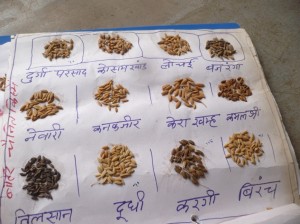GRAIN | 9 March 2016
 Signed in February 2016, the Trans Pacific Partnership (TPP) will have a major impact on farmers’ control over seeds. The US-led agreement, which covers 12 countries of the Asia-Pacific region (excluding China), opens the door to trade in genetically modified seeds and encourages member countries to apply intellectual property rights to the realm of “traditional knowledge” about plants and animals. While the TPP is cause for concern, another mega trade deal is being negotiated that could further threaten farmer seed sovereignty in Asia.
Signed in February 2016, the Trans Pacific Partnership (TPP) will have a major impact on farmers’ control over seeds. The US-led agreement, which covers 12 countries of the Asia-Pacific region (excluding China), opens the door to trade in genetically modified seeds and encourages member countries to apply intellectual property rights to the realm of “traditional knowledge” about plants and animals. While the TPP is cause for concern, another mega trade deal is being negotiated that could further threaten farmer seed sovereignty in Asia.
Like the TPP, the Regional Comprehensive Economic Partnership (RCEP) is a trade and investment agreement covering a wide range of issues including: trade in goods and services, intellectual property and dispute settlement. Some consider RCEP to be a “tamer” version of the TPP that is friendlier to low and middle-income countries. Indeed, the agreement—which includes China and excludes the US—is viewed as a geopolitical tool to counter the TPP. Like the TPP, however, RCEP is being negotiated without the participation of farmers, unions, indigenous peoples, health advocates, and other members of civil society.
Why does this matter? First, RCEP will impact more than four times the number of people affected by the TPP, covering 3.5 billion people and 12% of world trade. Second, leaked RCEP negotiating documents point to real dangers regarding local control over seeds and the fate of indigenous people’s and farmers’ traditional knowledge in Asia. The leaked texts indicate a strong push to increase the power of corporate seed companies like Monsanto and Syngenta; criminalise seed saving and exchange; and create databases of traditional knowledge available to patent offices.
Less well known than the TPP, RCEP is being negotiated behind closed doors and could sneak into Asia, destroying the livelihoods of billions of people. Broad alliances are urgently needed to raise awareness and stop this potentially devastating deal.
Report highlights:
- According to the Asia Pacific Seed Association, farm-saved seeds account for 80-90% of all seeds used in Asia.
- While the TPP covers 800 million people and 13% of world trade, RCEP will impact 3.5 billion people and 12% of world trade.
- RCEP will restrict seed saving and exchange at a time when, under the extreme pressures of climate change, farmers need more diversity in their fields, not less.
- RCEP could increase farmers’ dependence on external inputs and raise their costs of production; the trade deal could triple the current price for seeds.
- If seeds or traditional knowledge are compiled into databases and made available, companies like Monsanto and Syngenta could appropriate the knowledge and genetic resources of farming and indigenous communities.
Read and download the full report here: www.grain.org/e/5405
